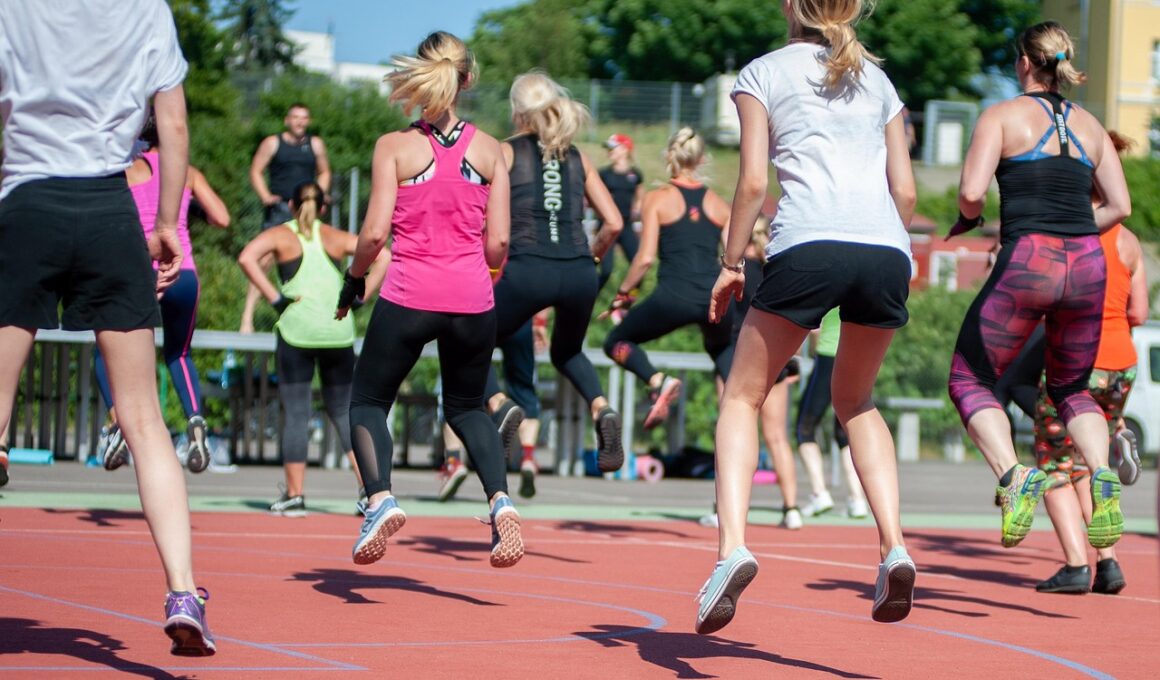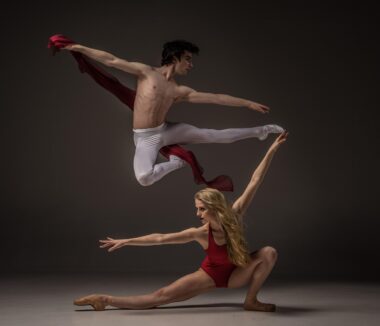How Zumba Builds Community and Social Connections
Zumba is not just a fun dance workout; it’s a vibrant community that fosters connections among participants. As people come together to groove to infectious beats, the experience transcends mere exercise. In group settings, individuals begin to share their personal stories, goals, and aspirations. These interactions create an environment of support and camaraderie, which is crucial for long-term fitness engagement. The joy of moving rhythmically while feeling the energy from fellow dancers empowers individuals. They laugh together, celebrate victories, and uplift one another during challenging weeks. This communal energy builds stronger relationships as they collectively work towards fitness goals. Importantly, Zumba classes often attract individuals from diverse backgrounds, creating a rich tapestry of cultures and experiences. Participants learn from each other, sharing varied perspectives on fitness, health, and lifestyle changes. This inclusivity is fundamental in nurturing a sense of belonging and acceptance. As the friendships deepen, many enroll in classes together, fostering accountability. The bonds formed in Zumba often extend beyond the dance floor as participants embark on social activities outside of class. This relational impact showcases Zumba’s unique ability to build lasting connections.
As friendships flourish within Zumba classes, a powerful network of support emerges, aiding personal development. Participants encourage one another to challenge their limits, celebrate successes, and even navigate setbacks. Those attending regularly tend to forge deeper ties, resulting in less isolation than conventional gyms often present. This closeness promotes a commitment to attendance, leading individuals to prioritize their health while nurturing friendships. Since Zumba classes focus on group dynamics, the exhilarating atmosphere is infectious, making it easier to keep each other motivated. As members dance together, they inadvertently create a shared goal of well-being. This team spirit invites participants to be accountable not only for themselves but also for one another. The relationships formed can evolve into workout buddies, nutrition advisors, or role models, fostering a culture of collaboration towards mutual success. Furthermore, many participants often engage in additional fitness programs or events, strengthening these connections over time. They may even participate in local Zumba marathons, charity events, or other group activities together. This unwavering connection among members reinforces fitness as a source of joy, bonding, and empowerment within communities.
The Role of Instructors in Community Building
In Zumba classes, instructors play a crucial role in cultivating community spirit. By fostering an engaging environment, they help to break down barriers and facilitate meaningful interactions. A supportive instructor can set the tone for the class, encouraging participants to express themselves freely and embrace the joyful atmosphere. Instructors often welcome new members with enthusiasm, creating a sense of belonging from the start. By learning participants’ names and personal goals, they establish trust and motivation. Engaging with participants helps to build rapport, inspiring individuals to feel valued in the Zumba community. Instructors don’t just lead routines; they also serve as cheerleaders during classes, celebrating each achievement and progress made. This encouragement often inspires individuals who might feel hesitant to start their fitness journey. Alongside this, many instructors organize social events and gatherings to foster deeper connections outside of regular classes. These events further solidify friendships as members bond over shared interests, thus positively influencing members’ overall experience in Zumba. With this facilitative approach, instructors actively contribute to creating an inclusive and thriving community through Zumba.
Moreover, community events linked to Zumba classes provide opportunities for social engagement beyond traditional dance sessions. In many regions, Zumba fans organize local workshops, special charity events, or dance contests aimed at uniting individuals while giving back to causes they care about. Such collective endeavors dedicate time and resources to various charitable organizations, deepening the connection among participants. Through these shared activities, bonds are formed that extend well beyond the dance floor, bringing people together for a common cause. These events often generate excitement and anticipation within the community, encouraging participants to invite friends and family. As new faces join, the sense of community continues to grow, welcoming diverse individuals into the Zumba fold. The feeling of unity fostered in such gatherings embodies Zumba’s ethos of inclusivity. In this way, members can forge friendships while participating in activities they love. Those interactions help create lasting memories that extend well beyond each experience in class. Consequently, it reinforces the notion that fitness can be both fun and fulfilling when done together, echoing the communal spirit intrinsic to Zumba.
Building a Supportive Environment
Participation in Zumba programs cultivates a supportive environment that enhances emotional wellness. This program fosters connections among individuals that transcend typical gym interactions. Many participants find motivation not only in the music and choreography but also in friendships formed within the class. The rhythm of the dance comes alive through camaraderie, allowing each participant to feel empowered. Participants witness first-hand how fitness can be an avenue for personal transformation when shared with others. As individuals progress in their Zumba journey, they often find themselves lifting each other emotionally. Together, they navigate challenges, provide encouragement, and cultivate positivity. This emotional support can be particularly valuable for individuals facing stress, anxiety, or isolation. Engaging in an active learning community boosts morale as everyone strives towards their fitness goals. Consequently, the inviting nature of Zumba creates a positive feedback loop of reinforcement that aids in personal well-being. As individuals experience growth alongside others who share similar aspirations, the overall atmosphere enhances motivation, leading to increased attendance and commitment. In turn, participants enjoy both physical and emotional benefits resulting from belonging to an uplifting community.
Ultimately, Zumba serves as a platform for holistic wellness, extending benefits to both physical fitness and social connections. As participants build a network of supportive friends, they gain much-needed confidence, encouraging them to step outside their comfort zones. Whether it’s trying new classes, attending Zumba-themed events, or exploring different types of dance, this community emboldens individuality. Members often share their successes, inspiring one another with stories of personal achievements, showcasing the pivotal role social connections play in motivational fitness journeys. Participants realize they can achieve more together, turning group fitness into a spirited challenge. As they perform high-energy routines, laughter often fills the air, making exercise feel less like a chore and more like a celebration. This joyous atmosphere strengthens relationships, fostering a sense of belonging as participants realize they are part of something larger. Gradually, connections made through Zumba expand into friendships, where individuals learn to socialize in a lively environment. Consequently, the joy found in these interactions transforms Zumba into an experience that nurtures both body and spirit.
Conclusion: The Lasting Impact of Zumba
In conclusion, the Zumba dance program exemplifies how fitness can transcend mere exercise to create lasting community bonds. Through fun, uplifting routines, participants form friendships that support their fitness goals while enhancing their emotional well-being. The relationships cultivated in Zumba classes generate shared experiences that elevate the overall motivation to participate continuously. As individuals support one another, they build a sense of belonging, helping create an environment ripe for personal growth and development. Additionally, instructors facilitate connections, contributing significantly to the community atmosphere acknowledged by students. The social elements are further reinforced through community events, showcasing Zumba’s incredible ability to unite individuals for a common purpose. Furthermore, this program thrives on inclusivity, welcoming diverse participants regardless of their fitness backgrounds. Emphasizing the joy of dance, Zumba provides a unique framework for connecting individuals who otherwise may never cross paths. Ultimately, the positive, enriching experiences that stem from Zumba continue divinely impacting each participant’s life long after they step off the dance floor, establishing a legacy of lasting connection, empowerment, and community spirit.
The embodiment of Zumba’s principles ensures everyone can experience the joy of movement intertwined with social connections. As members journey through their transformational experiences, they not only enhance their physical fitness but also achieve personal growth embedded within their communities. The friendships formed through shared passions reinforce commitment and inclusion, motivating individuals to remain engaged in a vibrant, supportive network that celebrates everybody’s unique fitness path. This inclusive environment fosters resilience, encourages accountability, and radiates positivity. Ultimately, Zumba’s community-centered approach highlights the power of collective wellness, demonstrating that emotional connections can energize the pursuit of healthy living. Participants discover the invaluable benefits of enjoying fitness together, transforming Zumba into an integral aspect of their lives. Through dance, laughter, and camaraderie, they experience the true essence of community fitness. The individuals attending Zumba classes become more than just participants; they form a family that celebrates achievements and nurtures joy, teaching everyone involved the extraordinary value of connection in the journey towards a healthier lifestyle. Thus, Zumba remains a sustainable fitness program that fosters lasting relationships and cultivates community amongst its dancers.








